2023
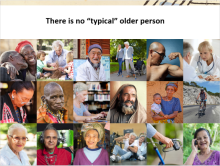
Lecture for students of the Graduate School of Medicine, Juntendo University by Director of WHO Kobe Centre
Dr Sarah L. Barber, Director, WHO Kobe Centre, gave a lecture to students of the International Gerontological Policy Studies for the Master's Course of the Graduate School of Medicine, Juntendo University on 14 July 2023. The title of the lecture was Economic and human resource aspect of aging and long-term care. The students engaged actively in the topic and demonstrated interest in gender aspects of long-term care workforce, selecting cost-effective interventions, combatting ageism, and the application of digital technology in the context of population ageing. The students expressed particular interest in the study conducted by WKC in cooperation with Kobe Municipality on the management of patients with cognitive decline.
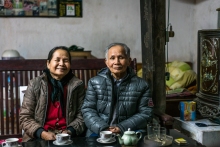
WHO Kobe looks at the impact of policy on healthy ageing for newSpecial magazine
Population aging poses huge challenges to policymakers across all sectors. Lack of policy action can result in workforce shortages, shortfalls in funding for social and health services, and increases in poverty. Gaps between life expectancy and healthy life expectancy imply that a large share of people may face disabling problems as they age.
In a new piece recently published in newSpecial, the staff magazine of Geneva-based international organizations, WHO Centre for Health Development Director Sarah L. Barber and Technical Officer Megumi Rosenberg examine how policy choices made today impact on whether people will age as healthy adults or whether people will face additional years of poor health, poverty and loneliness as they age.
Find the article in the June edition of newSpecial.
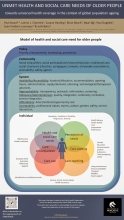
Preview of new global research consortium on unmet health and care need at 2023 International Association of Gerontology & Geriatrics (IAGG) Congress
The 2023 International Association of Gerontology & Geriatrics (IAGG) Asia/Oceania Regional Congress will be held in Yokohama, Japan, during 12-14 June.
WHO Centre for Health Development (WKC) partners from The University of Newcastle in Australia will be presenting a poster about our joint work on unmet health and care needs of older adults. They will also give the audience a preview of a new global research consortium that will address this important topic, which is expected to be launched later this year.
Global population aging presents significant implications for health system development. Current measures for monitoring global progress toward Universal Health Coverage (UHC), however, inadequately capture the complex health needs of older persons. To fill this gap in information, WKC carried out a systematic review and meta-analysis of foregone care among older people and a secondary analysis of survey data to estimate the prevalence of unmet needs among older people, ages 60 and over, in more than 80 countries.
This work led to the realization that much work is needed to improve the availability and quality of data, globally, on unmet needs for health care in general and specifically for older persons and their need for social care. So, as the next phase in this programme of work, WKC partnered with researchers at the University of Newcastle to undertake a consultative process of organizing a global research consortium to advance this field. This project brought together a network of global experts to take part in a series of colloquia around older persons’ unmet health and social care needs. The experts were selected to ensure diversity in expertise, region and setting, gender and career stage. In the end, they identified priority areas for future research including improving the comparability of measures of unmet needs and producing data for lower income countries. They suggested that as social care is less formalized than health care in most countries its measurement may be less amenable to standardization and more contextualized approaches may be needed. The experts agreed that a global research consortium can provide a platform for seeking consensus on definitions, measures and research methods to pave the way for a global applied research program on unmet needs of older persons.
On behalf of the project team, Janine Charnley of the University of Newcastle will be speaking on June 13 at 15:30. We encourage all to attend her presentation and visit Janine’s poster.
WKC believes in partnering with experts around the world to facilitate global discussions, promote innovation and research, and advance global health research agenda. To that end, WKC supports this new global research consortium to improve the understanding of and responses to the unmet health and social care needs of older people around the world. Find out more here.

WHO Joint Webinar on Research Capacity Building for Health Emergencies, 18 July 2023
Robust scientific evidence based on reliable research studies are essential for creating adequate and practical policies and practice for health emergency and disaster risk management (Health EDRM).
An online webinar will take place on 18 July 2023, jointly organised by WHO Kobe Centre, EMRO, EURO, aiming to promote research capacity building on Health EDRM and to increase collaboration among policy makers and researchers.
Date & Time: 18 July 2023, 13:00 – 14:55(CEST/Geneva & Copenhagen), 14:00(EET/Cairo), 20:00(JST/Kobe)
13:00 – 13:05 Opening remarks
13:05 – 14:00 Session 1 - Expert presentations: key knowledge to plan, conduct and report research project in emergencies and disasters
14:00 – 14:30 Session 2- Key challenges in regions and countries
14:30 – 14:50 Session 3- Comments and feedback – possible linkage and collaboration with other WHO initiatives
14:50 – 14:55 Closing remarks
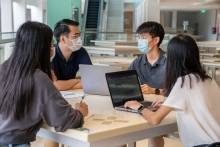
Maximizing Mental Health for University Students: Optimizing Digital Interventions
Mental health is a critical aspect of overall well-being, particularly among university students. However, the challenges faced by students, combined with the impact of the COVID-19 pandemic, have heightened the need for effective mental health interventions.
The research project by the WHO Centre for Health Development (WKC) and Kyoto University is aiming to optimize digital mental health interventions for university students.
University students often encounter mental health issues that can adversely affect their happiness, academic performance, and social relationships. The COVID-19 pandemic has exacerbated these challenges by amplifying social isolation. In response, universities have been exploring online therapeutic measures, particularly internet-based cognitive-behavioral therapy (CBT) programs, which have shown promising results in alleviating depressive and anxiety symptoms.
The "Healthy Campus Trial" was a multi-center randomized trial designed to examine and optimize the efficacy of digital CBT interventions delivered via a smartphone app. The study involved 1,093 participants recruited from five universities in Japan's Kansai and Chubu regions from 2018 to 2021.
The researchers created models that can predict how much someone's depressive symptoms will improve based on their personal characteristics and the specific components of the mental health program they had used. The study indicated even just regularly checking their own depressive symptoms had a significant impact on reducing depressive symptoms. The optimization algorithm for digital CBT components enables personalized guidance and precision medicine for university students facing depressive symptoms. Its impact extends to influencing trial designs and shaping decision-making in public health and clinical practice worldwide. The findings and algorithm will be presented to Japanese universities and local government authorities.
Caption: WHO / Amrita Chandradas

Paper published on a standardised real-time health data reporting system in health emergencies
Japan has experienced several large-scale earthquakes in the last ten years with devastating health and social impacts. A descriptive epidemiological study on health data management during emergencies was published in Prehospital and Disaster Medicine, from a research project led by Hiroshima University, Japan, and funded by the WHO Centre for Health Development (WHO Kobe Centre - WKC).
During the 2018 Hokkaido Earthquake, 32 Emergency Medical Teams (EMTs) used the Japanese version of Surveillance in Post-Extreme Emergencies and Disasters (J-SPEED) as a national standard daily reporting form. The standardised form collected information such as the number of patients and type of health problems complained during medical consultations by the EMTs. J-SPEED data captured 739 consultations in the 32-day period of the EMT response, and 97.6% of consultations occurred in the first 2 weeks. Most consultations were with people over 65 years old and women. Disaster stress related symptoms were the most frequently reported health condition (15.2%), followed by wounds (14.5%) and skin diseases (7.0%). This study identified the importance of the use of standardised data collection and reporting systems to visualise health impacts in order for data-driven coordination throughout EMT response and for developing evidence-based practice for the future.
Dr Ryoma Kayano, technical officer at WKC, co-authored the paper and emphasised the importance of providing evidence and increasing understanding of health problems during disasters using a standardised real-time data reporting system in order to strengthen health data management during health emergencies.
Yumiya Y, Chimed-Ochir O, Kayano R, Hitomi Y, Akahoshi K, Kondo H, Wakai A, Mimura S, Chishima K, Toyokuni Y, Koido Y, and Kubo T. (2023). Emergency Medical Team Response during the Hokkaido Eastern Iburi Earthquake 2018: J-SPEED Data Analysis. Prehospital and Disaster Medicine, 1-6. doi:10.1017/S1049023X23000432

Health Emergency Research Network presents at the World Association for Disaster and Emergency Medicine (WADEM) Congress in May 2023
In May, the World Association for Disaster and Emergency Medicine (WADEM) held its annual Congress on Disaster and Emergency Medicine in Killarney, Ireland. WHO Centre for Health Development (WHO Kobe Centre - WKC) was represented by Dr Ryoma Kayano, WHO technical officer and head of our Health Emergencies and Disaster Risk Management (Health EDRM) work.
WHO was invited to host a session at the Congress. Dr Kayano was joined by Dr Kai von Harbou of the WHO Health Emergencies Programme to open the session by introducing WHO initiatives on disaster risk reduction (DRR) and Health EDRM.
Dr Kayano moderated a panel discussion on ongoing research activities. The panel of experts that joined Dr Kayano were members of the WHO Thematic Platform for Health EDRM Research Network (Health EDRM RN). They highlighted the crucial role of Health EDRM RN in promoting global collaborative activities, such as joint webinars, joint training programmes, and international research collaboration projects, to increase Health EDRM research capacity. They shared previous and current achievement, including the establishment of research partnerships, such as The Asia Pacific Disaster Mental Health Network, and the development of collaborative documents such as the WHO Health EDRM Framework (2019) and the WHO guidance on research methods for health emergency and disaster risk management (revised 2022).
They also discussed future strategies, including: building training courses; opportunities to increase collaboration and networking in regional and global meetings; and strengthening promotional strategies to disseminate evidence.
Many thanks to:
Mr Andrew Lavelle, World Association of Disaster and Emergency Medicine, the United States
Professor Virginia Murray, UK Health Security Agency, the United Kingdom
Dr Odgerel Chimed-Ochir, Hiroshima University, Japan
Dr Benjamin Ryan, Baylor University, the United States
Dr Kai von Harbou, World Health Organization, Switzerland
Dr Tatsuhiko Kubo, Hiroshima University, Japan
Follow more news from the WADEM Congress at #wadem2023.
Picture: Dr Tatsuhiko Kubo, Dr Odgerel Chimed-Ochir, Dr Kai von Harbou, Professor Virginia Murray, Dr Ryoma Kayano, and Dr Benjamin Ryan present the revised WHO Guidance. Photo courtesy of WADEM.
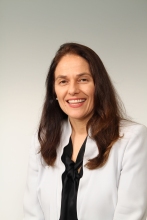
Lecture for the medical students of the Ohio State University
On 15 May, the Director of the WHO Centre for Health Development, Dr Sarah L. Barber, gave a guest lecture to students studying medicine at the Ohio State University.
She spoke with the 4th Year Students about Sustainable Development Goals (SDGs) as part of their preparations for medical rotations abroad.
Mid-way through the SDG agenda progress, she emphasized that there are still opportunities to accelerate progress towards Goal 3, good health and well-being.
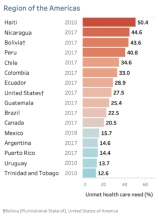
New estimates of unmet healthcare need around the world
Many countries are working towards the acceleration of universal health coverage (UHC). But what happens if your population doesn’t have the same level of access to quality care services, or can’t afford it even if they do? How do you find out how many have ‘unmet healthcare needs’?
A recent study supported by the WHO Centre for Health Development (WHO Kobe Centre - WKC) explored how to capture this information using household surveys.
The analysis examined self-reports on unmet need for healthcare - a time when a person had a health concern but did not receive medical attention - asked as part of 17 health, social, and economic surveys. The surveys were conducted between 2001 and 2019 across 83 low-, middle- and high-income countries.
Noting the large variation in questions and response categories, the results point to low levels (less than 2%) of unmet need reported in adults aged 60+ years in countries like Andorra, Qatar, Republic of Korea, Slovenia, Thailand and Viet Nam to rates of over 50% in Georgia, Haiti, Morocco, Rwanda, and Zimbabwe.
These estimates may underestimate the problem if we consider the many cases of older people who do not recognize their health problems or have low expectations for health and long term care and therefore under-report their unmet needs. This gap in accounting for unmet needs around the world is contributing not only to the underutilization of needed services but also to widening inequalities in healthcare access and outcomes.
Unmet need for healthcare is a major concern for older individuals and their families, for national policymakers who aim to ensure older population’s health needs are met, and for global efforts to track progress toward UHC
Find more about our work on unmet needs here.
WKC Working Paper: Prevalence of unmet health care need in older adults in 83 countries – measuring progressing towards universal health coverage in the context of global population ageing.
This paper was written by Paul Kowal, Barbara Corso, Kanya Anindya, Flavia C.D. Andrade, Thanh Long Giang, Maria Teresa Calzada Guitierrez, Wiraporn Pothisiri, Nekehia T. Quashie, Herney Alonso Rengifo Reina, Megumi Rosenberg, Andy Towers, Paolo Miguel Manalang Vicerra, Nadia Minicuci, Nawi Ng, and Julie Byles.
Photo caption: Prevalence of unmet healthcare need overall for adults 60 years old and above using the most recently available data (survey year shown) by country in the WHO Region of the Americas
Note: Results are unweighted due to differences in weights provided for each study. Results for other countries and regions are presented in the working paper.
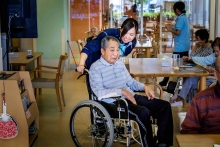
Building predictive models to better understand older people’s unmet health needs around the world
As populations age, their health needs become increasingly complex. But in many countries, not all health needs of older people are being met, with services either not being provided, accessed, or affordable. Measuring older people’s unmet needs in health is a complex and multifaceted problem, with no standard definition or agreed method of measurement. Needs may be partially met, met with difficulty or delay, or met sometimes and not other times. Health and social care services might be available, accessed and provided, but not necessarily in a way that is appropriate to the problem, or acceptable to the patient. Current survey instruments don’t always catch those with unmet needs or capture all the nuance required to understand why needs went unmet.
A recent study supported by the WHO Centre for Health Development (WHO Kobe Centre – WKC) explored how to capture and predict this information using novel mathematical models.
Existing studies of unmet health need often use self-reporting in surveys to measure unmet need; however, on their own, self-reporting depends on a number of factors that introduce bias, such as perception of need and propensity to seek care, and do not provide further information on why care could not be obtained, what demand or supply side barriers exist, or how coverage could be improved. Previous studies supported by WKC found a very wide range of levels of unmet need from self-reported surveys.
The authors aimed to better estimate true prevalence by identifying other measures that could serve as proxy indicators of unmet need, such as the individual’s personal factors (age, sex, and education level), enabling factors (social and financial support), and contextual factors (healthcare system and setting).
The study found that a universally applicable model was not possible - personal, social, and contextual factors play a more definitive role than was anticipated. Certain factors were more important in determining levels of unmet need in some countries and settings than in others, preventing the development of a universal method of measurement. While unmet need for health among older people remains a primary emerging issue for most countries around the world, more research is needed to understand country- and region-specific context that contribute to unmet need.
Find more about our work on unmet needs here.
WKC Working Paper: Measuring unmet need for older adults in low-, middle- and high-income countries: theoretical and analytical model building.
This paper was written by Barbara Corso, Kanya Anindya, Nawi Ng, Nadia Minicuci, Megumi Rosenberg, Paul Kowal, and Julie Byles.

